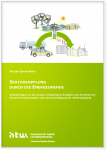 The EEG is supposed to achieve the goals of the Paris climate summit. But at the rate of expansion to date, according to a study by Berlin's HTW, we will have to wait until 2150 for Germany to switch completely to renewable energies.
The EEG is supposed to achieve the goals of the Paris climate summit. But at the rate of expansion to date, according to a study by Berlin's HTW, we will have to wait until 2150 for Germany to switch completely to renewable energies.
It is not news that the implementation of the climate turnaround will not proceed without effort. Based on the expansion progress of energy systems for renewable energies from the years 2000 to 2015, Volker Quaschning from the Berlin University of Applied Sciences has calculated in the so-called "sector coupling study".how long it would take for Germany to obtain 100 per cent of its energy from renewable sources. He arrives at the year 2150.
"Paris goals practically impossible"
"This makes it practically impossible to meet the Paris targets. Either the political leaders lack the necessary expertise or they do not intend to comply with the climate protection agreement at all," says Quaschning.
"We need to expand wind and solar energy three to six times faster than planned by the federal government," Volker Quaschning specified the results of his research group Solar Storage Systems at HTW Berlin: onshore wind power would have to be expanded by 6.3 gigawatts net per year instead of 2.8 GW gross, as envisaged in the EEG 2016. In the case of photovoltaics, as much as 15 GW would be required annually instead of the 2.5 GW envisaged in the EEG.
The HTW Berlin sector coupling study is available for download at the following link: https://pvspeicher.htw-berlin.de/sektorkopplungsstudie
At www.greenpeace-energy.de/presse you will also find a fact sheet with key results of the HTW study and additional calculations by Greenpeace Energy on the need for long-term storage (wind gas / power to gas) in the context of sector coupling.
Press release from 20 June 2016 by Greenpeace Energy eG and Prof. Dr. Volker Quaschning, Renewable Energies Course, Berlin University of Applied Sciences
Keywords: 100% EEs, CO2-neutral, Renewable, Research, Climate protection, New books and studies, Environmental policy

